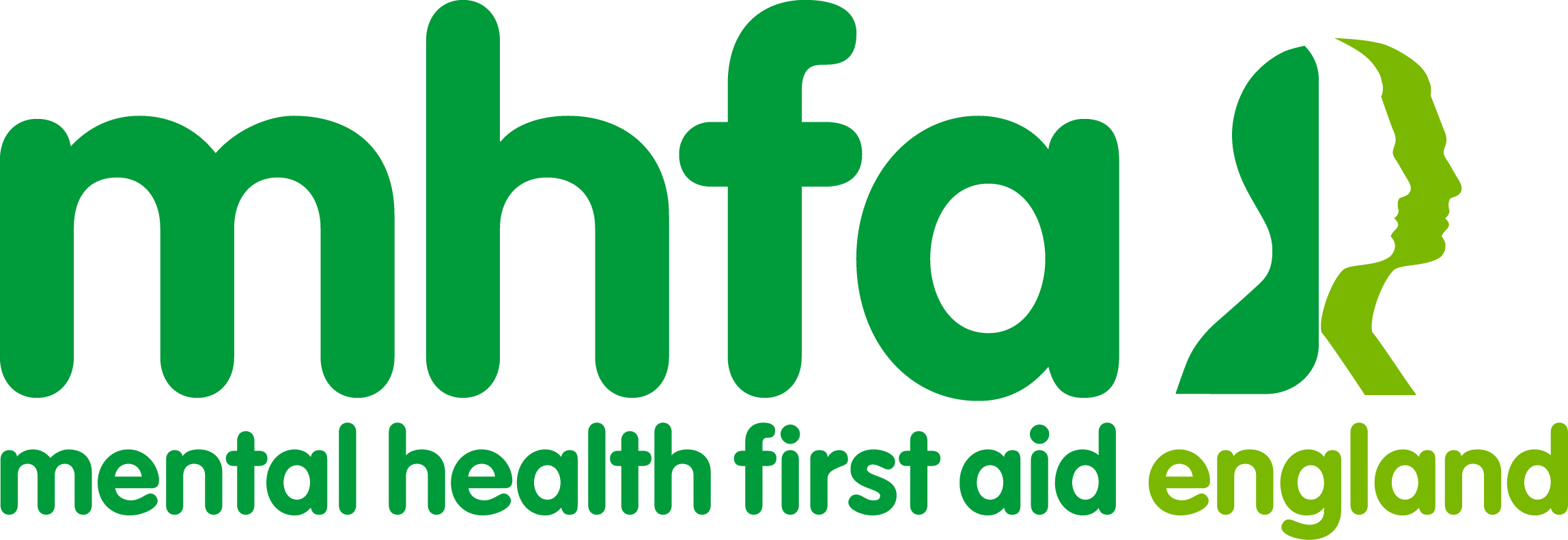 UK
businesses are losing over £1000 a year for every person they employ because
of mental illness in their workforce.
Employees take over 70 million mental health sick days a year.
It costs over £25.9 billion a year.
If someone told you that they feel suicidal / strange / depressed, would you
know what to do?
UK
businesses are losing over £1000 a year for every person they employ because
of mental illness in their workforce.
Employees take over 70 million mental health sick days a year.
It costs over £25.9 billion a year.
If someone told you that they feel suicidal / strange / depressed, would you
know what to do?
What is Mental Health First Aid (MHFA)?
MHFA is the help given to someone experiencing a mental health problem
before professional help is obtained. The aims are:
·
to preserve life where a person may be a danger to themselves or others
·
to provide help to prevent the mental health problems developing into a more
serious state
·
to promote the recovery of good mental health
·
to provide comfort to a person experiencing a mental health problem
MHFA does not teach people to be therapists. However, it does teach people
how to
recognise
the symptoms of mental health problems, how to provide initial help and how
to guide a person towards appropriate professional help.
Mental Health First Aid is exactly what it suggests, a first aid approach to
mental health. Originally conceived by Betty Kitchener and Professor Tony
Jorm
in Australia, the introduction of Mental Health First Aid (MHFA) has become
an international activity: Hong Kong, Finland, Singapore, Canada and
Scotland have all introduced mental health first aid. Wales and Ireland are
currently working on introducing MHFA, so along with the introduction to
England, UK wide coverage will be achieved.
Why do we need it?
·
Mental health problems are common.
·
One person in four will experience some form of mental health problems in
any year.
·
There is a stigma associated with mental health problems.
·
Many people are not well informed about mental health or mental health
problems.
·
In 2002/03 the economic and social cost of mental health problems in England
was £77 billion.
·
The economic and social cost of mental health problems is greater than that
of crime and larger than the total amount spent on all NHS and social
services in the UK.
·
Stress, anxiety and depression accounted for a third of the 168 million
working days lost in the UK for health and related reasons in 2004,
translating to a cost of sickness absence of about £4.1 billion.
·
Professional help is not always on hand.
·
People may lack the insight to realise that they need help or that help is
available.
·
The majority of people often do not know how to help
·
We can help to prevent mental health problems by:
§
increasing
awareness
§
reducing risk factors where possible
§
promoting positive coping strategies.
Who will benefit?
·
General Public
·
Employees
·
Employers
·
Voluntary Groups
·
Service industries
·
Leisure industries
Length of course
·
2 days or 4 ‘sessions’
·
Course numbers – minimum 6
, maximum 14
Sample of content
·
Introduction and outline the ‘5 steps’ of
appropriate action
·
Depression - Definition / risks / First Aid /
Treatments
·
Anxiety Disorders - Definition / risks / First Aid
/ Treatments
·
Psychosis - Definition / risks / First Aid /
Treatments
Return on Investment
Improved recognition, identification and
appropriate action to mental health issues, leading to:
·
Decreased sickness
·
Increased staff morale
·
Increased productivity
·
Healthier’ workforce
·
Confident and competent staff who can work with
colleagues / the public to respond appropriately to their needs.
Course
Program
The program will normally be delivered over two consecutive days but
can be tailored to meet the individual needs of companies and organisations.
For more information about this please contact me.
Day 1 - Morning
Session 1
•
Why mental health first aid?
•
Mental health policy in England.
•
What is mental health?
•
Common mental health problems.
•
Attitudes and Shift anti-stigma campaign.
•
The five steps of mental health first aid.
•
What is depression?
•
Symptoms of depression.
•
Risk factors for depression.
•
Depression in the workplace.
Day 1 Afternoon
Session 2
•
Suicide in England and Wales.
•
Crisis first aid for suicidal
behaviour.
•
Crisis first aid for overdose.
•
First aid for depression.
•
Treatment and resources for depression.
Day 2 - Morning
Session 3
•
What are anxiety disorders (PTSD, GAD, social phobia, panic disorder,
agoraphobia, OCD)?
•
Symptoms of anxiety disorders.
•
Alcohol, drugs and anxiety disorders.
•
Crisis first aid for panic attacks.
•
Crisis first aid for acute stress reaction.
•
Treatment and resources for anxiety disorders.
•
Other expressions of distress, including self-harm.
Day 2 - Afternoon
Session 4
•
What are psychotic disorders (schizophrenia, bipolar disorder)?
•
Symptoms of psychotic disorders.
•
Risk factors for psychosis.
•
Crisis first aid for acute psychosis.
•
Treatment and resources for psychosis.
•
Action planning for using MHFA.
